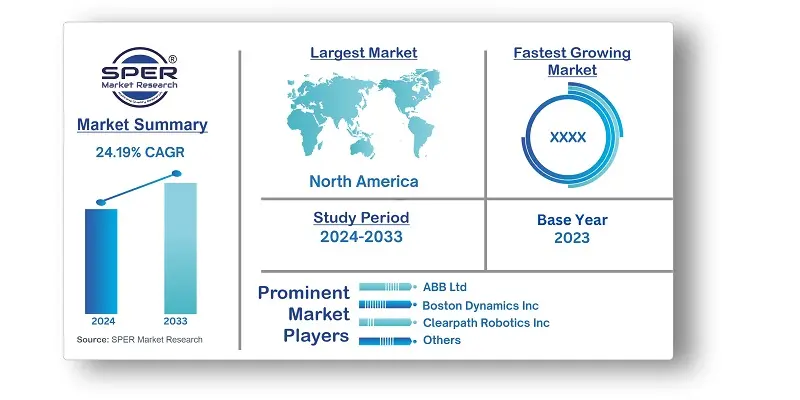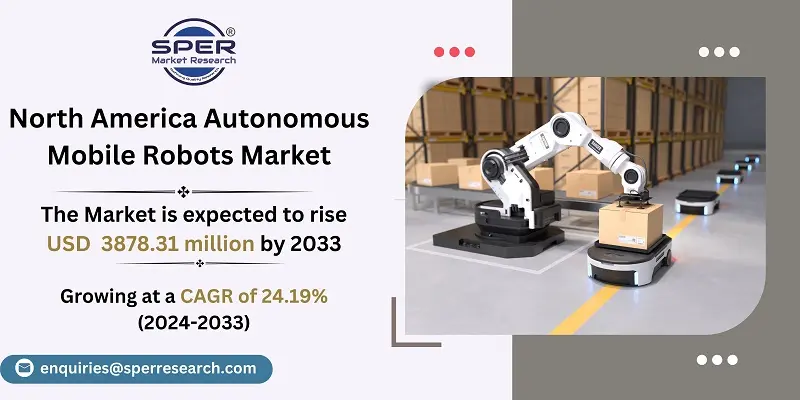
North America Autonomous Mobile Robots Market Growth, Trends, Size, Share and Future Outlook
North America Autonomous Mobile Robots Market Size- By Component, By Type, By End User- Regional Outlook, Competitive Strategies and Segment Forecast to 2033
| Published: Feb-2024 | Report ID: IACT2442 | Pages: 1 - 155 | Formats*: |
| Category : Information & Communications Technology | |||


| Report Metric | Details |
| Market size available for years | 2020-2033 |
| Base year considered | 2023 |
| Forecast period | 2024-2033 |
| Segments covered | By Component, By Type, By End Use |
| Regions covered | U.S., Canada, and Mexico |
| Companies Covered | ABB Ltd, Boston Dynamics Inc, Clearpath Robotics Inc, Geekplus Technology Co Ltd, Kivnon Logistica SL, Locus Robotics Corp, Milvus Robotics, OMRON Corp, Teradyne Inc |
- hManufacturing Sector
- Logistics and Warehousing
- E-commerce and Retail
- Healthcare
- Technology Companies
- Research and Development Institutions
- Government and Defense Agencies
- Supply Chain Management Companies
- Investors and Venture Capitalists
- System Integrators and Service Providers
| By Component: |
|
| By Type: |
|
| By End Use: |
|
- North America Autonomous Mobile Robots Market Size (FY’2023-FY’2033)
- Overview of North America Autonomous Mobile Robots Market
- Segmentation of North America Autonomous Mobile Robots Market By Component (Hardware, Software and Services)
- Segmentation of North America Autonomous Mobile Robots Market By Type (Picking Robots, Self-Driving Forklifts, Autonomous Inventory Robots)
- Segmentation of North America Autonomous Mobile Robots Market By End Use (Manufacturing, Distribution & Warehousing)
- Expansion Analysis of North America Autonomous Mobile Robots Market
- Problems and Obstacles in North America Autonomous Mobile Robots Market
- Competitive Landscape in the North America Autonomous Mobile Robots Market
- Impact of COVID-19 and Demonetization on North America Autonomous Mobile Robots Market
- Details on Current Investment in North America Autonomous Mobile Robots Market
- Competitive Analysis of North America Autonomous Mobile Robots Market
- Prominent Players in the North America Autonomous Mobile Robots Market
- SWOT Analysis of North America Autonomous Mobile Robots Market
- North America Autonomous Mobile Robots Market Future Outlook and Projections (FY’2023-FY’2033)
- Recommendations from Analyst
1.1. Scope of the report1.2. Market segment analysis
2.1. Research data source2.1.1. Secondary Data2.1.2. Primary Data2.1.3. SPER’s internal database2.1.4. Premium insight from KOL’s2.2. Market size estimation2.2.1. Top-down and Bottom-up approach2.3. Data triangulation
4.1. Driver, Restraint, Opportunity and Challenges analysis4.1.1. Drivers4.1.2. Restraints4.1.3. Opportunities4.1.4. Challenges4.2. COVID-19 Impacts of the North America Autonomous Mobile Robots Market
5.1. SWOT Analysis5.1.1. Strengths5.1.2. Weaknesses5.1.3. Opportunities5.1.4. Threats5.2. PESTEL Analysis5.2.1. Political Landscape5.2.2. Economic Landscape5.2.3. Social Landscape5.2.4. Technological Landscape5.2.5. Environmental Landscape5.2.6. Legal Landscape5.3. PORTER’s Five Forces5.3.1. Bargaining power of suppliers5.3.2. Bargaining power of buyers5.3.3. Threat of Substitute5.3.4. Threat of new entrant5.3.5. Competitive rivalry5.4. Heat Map Analysis
6.1. North America Autonomous Mobile Robots Market Manufacturing Base Distribution, Sales Area, Product Type6.2. Mergers & Acquisitions, Partnerships, Product Launch, and Collaboration in North America Autonomous Mobile Robots Market
7.1. North America Autonomous Mobile Robots Market Value Share and Forecast, By Component, 2024-20337.2. Hardware7.3. Software and Services
8.1. North America Autonomous Mobile Robots Market Value Share and Forecast, By Type, 2024-20338.2. Picking Robots8.3. Self-Driving Forklifts8.4. Autonomous Inventory Robots
9.1. North America Autonomous Mobile Robots Market Value Share and Forecast, By End Use, 2024-20339.2. Manufacturing9.3. Distribution & Warehousing
10.1. North America Autonomous Mobile Robots Market Size and Market Share
11.1. North America Autonomous Mobile Robots Market Size and Market Share By Component (2019-2026)11.2. North America Autonomous Mobile Robots Market Size and Market Share By Component (2027-2033)
12.1. North America Autonomous Mobile Robots Market Size and Market Share By Type (2020-2026)12.2. North America Autonomous Mobile Robots Market Size and Market Share By Type (2027-2033)
13.1. North America Autonomous Mobile Robots Market Size and Market Share By End Use (2020-2026)13.2. North America Autonomous Mobile Robots Market Size and Market Share By End Use (2027-2033)
14.1. North America Autonomous Mobile Robots Market Size and Market Share By Region (2020-2026)14.2. North America Autonomous Mobile Robots Market Size and Market Share By Region (2027-2033)14.3. US14.4. Canada14.5. Mexico
15.1. OMRON Corp15.1.1. Company details15.1.2. Financial outlook15.1.3. Product summary15.1.4. Recent developments15.2. Milvus Robotics15.2.1. Company details15.2.2. Financial outlook15.2.3. Product summary15.2.4. Recent developments15.3. Geekplus Technology Co Ltd15.3.1. Company details15.3.2. Financial outlook15.3.3. Product summary15.3.4. Recent developments15.4. ABB Ltd15.4.1. Company details15.4.2. Financial outlook15.4.3. Product summary15.4.4. Recent developments15.5. Clearpath Robotics Inc15.5.1. Company details15.5.2. Financial outlook15.5.3. Product summary15.5.4. Recent developments15.6. Locus Robotics Corp15.6.1. Company details15.6.2. Financial outlook15.6.3. Product summary15.6.4. Recent developments15.7. Boston Dynamics Inc15.7.1. Company details15.7.2. Financial outlook15.7.3. Product summary15.7.4. Recent developments15.8. Teradyne Inc15.8.1. Company details15.8.2. Financial outlook15.8.3. Product summary15.8.4. Recent developments15.9. Others
SPER Market Research’s methodology uses great emphasis on primary research to ensure that the market intelligence insights are up to date, reliable and accurate. Primary interviews are done with players involved in each phase of a supply chain to analyze the market forecasting. The secondary research method is used to help you fully understand how the future markets and the spending patterns look likes.
The report is based on in-depth qualitative and quantitative analysis of the Product Market. The quantitative analysis involves the application of various projection and sampling techniques. The qualitative analysis involves primary interviews, surveys, and vendor briefings. The data gathered as a result of these processes are validated through experts opinion. Our research methodology entails an ideal mixture of primary and secondary initiatives.



Frequently Asked Questions About This Report
PLACE AN ORDER
Year End Discount
Sample Report
Pre-Purchase Inquiry
NEED CUSTOMIZATION?
Request CustomizationCALL OR EMAIL US
100% Secure Payment






Related Reports
Our Global Clients
Our data-driven insights have influenced the strategy of 200+ reputed companies across the globe.




















